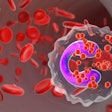
Vitamin C supplementation during pregnancy may significantly improve lung function and reduce asthma risk in children born to smokers. According to the study, “Vitamin C Supplementation to Pregnant Smokers Alters Asthma- and Allergy-Associated CpGs in Child Buccal DNA at Five Years of Age,” published in the journal, Clinical Epigenetics, the data provide new insights into how prenatal nutrition can influence long-term respiratory health through epigenetic changes.
The researchers studied 137 children included in the 2017 clinical trial, “Vitamin C to Decrease the Effects of Smoking in Pregnancy on Infant Lung Function (VCSIP).” The objective of the more recent study was to examine associations of vitamin C treatment and lung function with buccal DNAm using a custom-content Asthma&Allergy array enriched for asthma and allergy loci likely to have a functional impact on gene expression.
The study analyzed DNA methylation patterns in buccal cells of five-year-old children whose mothers smoked during pregnancy and were randomized to receive either 500 mg/day of vitamin C or a placebo. Using a custom Asthma&Allergy DNA methylation array, researchers identified specific genetic loci (known as CpGs) associated with asthma and allergy that were differentially methylated in the vitamin C group.
According to the study’s authors, epigenetic changes appear to mediate the beneficial effects of vitamin C on lung function. Genes involved in iron transport and ferroptosis — a form of cell death linked to inflammation — were among those affected.
Children in the vitamin C group showed significantly better forced expiratory flow (FEF25–75) and lower incidence of wheeze between ages four and six. The study also found that DNA methylation at five CpGs mediated a substantial portion of the vitamin C effect on lung function, including two within the SLC25A37 gene, which plays a role in mitochondrial iron transport.
The study’s authors said their findings suggest that vitamin C may counteract some of the harmful effects of maternal smoking by modifying gene expression related to respiratory development. Researchers also noted sex-specific differences, with female children showing more pronounced epigenetic changes.
While the study acknowledges limitations such as sample size and lack of external validation, it marks a significant step toward understanding how prenatal interventions can shape childhood health outcomes.






















